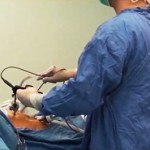Fish Oils and Prostate Cancer
If a Blog can be a call for help, then this is it! Since the recent high-profile paper in JNCI (https://jnci.oxfordjournals.org/content/early/2013/07/09/jnci.djt174.abstract) suggesting that Omega 3 supplements increase the risk of Prostate Cancer and induce high grade prostate cancer, I am plagued by patient and colleague concerns about whether or not men should stop taking Omega 3 supplements! I know that health care providers all over the world have been similarly inundated. What are we to say to our patients?
 Let us first look at the paper. The authors used data collected as part of the Selenium and Vitamin E Cancer Prevention Trial (SELECT) to determine whether men with high levels of plasma phospholipid fatty acids (high levels of which are present in fish oil supplements), namely long-chain ω-3 polyunsaturated fatty acids ([LCω-3PUFA], were at higher risk of developing prostate cancer. The case subjects in the study were 834 men diagnosed with prostate cancer, of whom 156 had high-grade cancer. The comparison cohort consisted of 1393 men selected randomly at baseline and matched to case subjects on age and race. Proportional hazards models estimated hazard ratios (HR) and 95% confidence intervals (CI) for associations between fatty acids and prostate cancer risk overall and by grade. The results? Compared with men in the lowest quartiles of LCω-3PUFA, men in the highest quartile had increased risks for low-grade (HR = 1.44, 95% CI = 1.08 to 1.93), high-grade (HR = 1.71, 95% CI = 1.00 to 2.94), and total prostate cancer (HR = 1.43, 95% CI = 1.09 to 1.88). These results are strong enough for the authors to conclude that there is increased prostate cancer risk among men with high blood concentrations of these plasma phospholipid fatty acids, and that “the consistency of these findings suggests that these fatty acids are involved in prostate tumorigenesis”.
Let us first look at the paper. The authors used data collected as part of the Selenium and Vitamin E Cancer Prevention Trial (SELECT) to determine whether men with high levels of plasma phospholipid fatty acids (high levels of which are present in fish oil supplements), namely long-chain ω-3 polyunsaturated fatty acids ([LCω-3PUFA], were at higher risk of developing prostate cancer. The case subjects in the study were 834 men diagnosed with prostate cancer, of whom 156 had high-grade cancer. The comparison cohort consisted of 1393 men selected randomly at baseline and matched to case subjects on age and race. Proportional hazards models estimated hazard ratios (HR) and 95% confidence intervals (CI) for associations between fatty acids and prostate cancer risk overall and by grade. The results? Compared with men in the lowest quartiles of LCω-3PUFA, men in the highest quartile had increased risks for low-grade (HR = 1.44, 95% CI = 1.08 to 1.93), high-grade (HR = 1.71, 95% CI = 1.00 to 2.94), and total prostate cancer (HR = 1.43, 95% CI = 1.09 to 1.88). These results are strong enough for the authors to conclude that there is increased prostate cancer risk among men with high blood concentrations of these plasma phospholipid fatty acids, and that “the consistency of these findings suggests that these fatty acids are involved in prostate tumorigenesis”.
Crikey! Fish oil supplements increase risk of prostate cancer! Is it really so?? Is the study methodology robust enough to change practice? Undoubtedly, there are a lot of patients taking these supplements, some prescribed by medical practitioners; even my lovely ophthalmologist wife tells me that nearly every patient with macular degeneration worldwide is on it! My knowledge of antioxidants is somewhat pedestrian and I feel like an amateur in advising whether or not men should discontinue Omega 3 supplements.
What should we tell those who ask us? All comments gratefully received.
Dr David Quinlan
Consultant Urologist, St Vincent’s Hospital,
Senior Lecturer, University College Dublin
Chairman, BJUI
Twitter: @daithiquinlan




I am sure that clinicians all over the world will recognise David’s call for help! Omega-3 supplements (and supplements in general) are very popular in Australia and are big business and I have had a lot of patients asking this question recently. My take on this paper is that the media headlines which resulted from this study are not underpinned by the science contained within it. This was not a randomised controlled trial of fish oil supplements versus no fish oil supplements. In fact, it is not known how many men in either arm actually took fish oil supplements or had a huge amount of fish in their diet. Other reasons can explain higher levels of DHA omega-3, including a low fat diet.
Some have speculated that much of the media headlines were driven by the “anti-supplements industry” (see Huff Post blogger Dr Jonny Bowden https://www.huffingtonpost.com/dr-jonny-bowden/fish-oil-prostate-cancer_b_3601906.html) and there may be some truth to this.
Either way,although this study is of interest, the study design and data presented are not sufficient to conclude that omega-3 fatty acids are conclusively linked to increased risk of prostate cancer and that is what I tell my patients at present.
I am delighted to be able to have the opportunity to comment on this study and on Mr David Quinlan’s appeal in relation to it. David was one of my trainers here in Ireland and taught me much of what I know about prostate cancer, but I do not have any recollection of us engaging in a deep meaningful conversation in relation to omega-3 fatty acids and the risk of prostate cancer, as I’m sure he will not either! I was made aware of this study when I was asked to discuss it on one of our national radio stations and discovered that although there was an extensive press release, the study itself was not available until later on that day. However the press release was being carried by almost all of the major news channels and online versions of broadsheet newspapers in Great Britain and Ireland, which is a commentary on the speed of dissemination of information and the problems with the rapid information culture and 24 news cycle in which we live today.
Thus in summary, my advice is to tell your patients that everything should be taken in moderation, and that exogenous vitamin/supplements ingestion is not necessary, and may do harm. It is also interesting to note that the purported cardiovascular benefits of omega-3 fatty acids have also been called into serious question recently. Thus if we are seeing little benefit, and possible potential harm, from the use of an unregulated poorly tested quasi medication, the best advice, to my mind, Is to tell people not to take it on the basis of current evidence.
Thank you Declan and David. Wise Counsel from you both. Firstly, Declan you are reassuring me, my patients and my colleagues that the scientific rigour of this study is questionable and that it should not frighten men who have been taking Omega 3. There is no good evidence that they have been taking a Prostate Cancer Promoter. Secondly, David you are hitting a chord with me that a balanced diet is better than supplements. As the Irish playwright Oscar Wilde said “Everything in Moderation, including Moderation”.
Diet and Prostate cancer is very controversial and I continue to advice my patients that “we do not really know”. Last week a patient of mine stopped taking fish oil capsules based on this recent news.
At this rate we will have to stop eating totally because everything in our diet could potential help one condition and hinder something else.
As a child growing up, my family from Bengal insisted that I eat more fish to maintain a good eyesight. Fish (in particular a delicacy called Hilsa steamed in banana leaf with mustard – a visit to Brick Lane to try this is highly recommended) is very popular in West Bengal and Bangladesh because of the river Ganges which meets the Bay of Bengal. For many thousands of years the belief has been that it protects your eyes. No randomised trials that I know of! Prostate cancer is certainly not commoner in this part of the world than anywhere else.
Fully agree with Declan – the media hype bears little relation to the strength of the science. Nonetheless, this will only increase the number of patient questions re diet & supplements. My take is based on dr mark moyad’s books & talks: what’s “heart healthy” is “prostate healthy” – and the “healthy diet” is far more precisely defined – less calories, less fat, less refined sugars, less red meat (especially if chatred), more complex carbohydrates, more & varied fruits & veg.
As for supplements – given the doubts over putative benefits & emerging concerns over possible harms – I would urge caution!
Dyslipidemia and its consequences are emerging as epidemics with deleterious consequences on cardiovascular (CV) health. The beneficial effects of omega-3-fatty acids on cardiac and extra cardiac organs have been extensively studied in the last two decades, and continue to show great promise in the primary and secondary prevention of cardiovascular diseases (CVDs). Omega-3-fatty acid supplementation has been proven to have beneficial action on lipid profile, cytokine cascade, oxidant-anti-oxidant balance, parasympathetic and sympathetic tone and nitric oxide synthesis.
However, recent large prospective studies of dietary Omega-3 fatty acid intake have found increased risk of prostate cancer among men with high blood concentrations of long-chain Omega-3 polyunsaturated fatty acids. The recently reported case-cohort study by Brasky et al in the J Natl Cancer Inst. examined associations between plasma phospholipid fatty acids and prostate cancer risk among participants in the Selenium and Vitamin E Cancer Prevention Trial. Case subjects were 834 men diagnosed with prostate cancer, of which 156 had high-grade cancer. The sub-cohort consisted of 1393 men selected randomly at baseline and from within strata frequency matched to case subjects on age and race.
Compared with men in the lowest quartiles of LCω-3PUFA, men in the highest quartile had increased risks for low-grade (HR = 1.44, 95% CI = 1.08 to 1.93), high-grade (HR = 1.71, 95% CI = 1.00 to 2.94), and total prostate cancer (HR = 1.43, 95% CI = 1.09 to 1.88). Associations were similar for individual long-chain ω-3 fatty acids. Higher linoleic acid (ω-6) was associated with reduced risks of low-grade (HR = 0.75, 95% CI = 0.56 to 0.99) and total prostate cancer (HR = 0.77, 95% CI = 0.59 to 1.01); however, there was no dose response.
This study confirms previous reports of increased prostate cancer risk among men with high blood concentrations of LCω-3PUFA. The consistency of these findings suggests that these fatty acids may be involved in the development of prostate cancer.
Urologists should therefore be wary in assuming that what is good for your heart is also automatically good for your prostate. I am currently advising those concerned about or especially at risk of developing prostate cancer to discontinue regular intake of Omega-3 fish oils.
Roger, thank you. A different view after a detailed scientific examination of this paper. You clearly feel this article has merit as you have suggested men stop taking fish oils. I take no supplements, but do like fish and eat a lot of fish. Do we jump to the next level and suggest I don’t eat as much fish? A decade ago we were being told to diminish the amount of products whe consumed that came from animals with four legs. The cardiologists recently have just done a complete flip on eggs (no pun!). The Japanese who consume a lot of fish have low rates of prostate cancer. What do I do with my love a fish? Do I advise my lovely Ophthalmologist wife and her colleagues to desist from prescribing Omega 3 to their patients with Macular Degeneration?
I am not a dietician or a Doctor but surely common sense will tell us the body will throw away any supplements it is forced to take in pursuit of improving an existing illness. When one considers even when ill a person Body Chemistry is perfectly balanced on instructions of the subconscious mind. Please post this unique paper as the link below as it is seriously linked to the paper above. https://talkingcures.co.uk/illness%20or%20Toxic%20Shock.html
This topic of association between fish oil and prostate cancer hasn’t “arrived” in any of the radio channel or newspaper in HK. But I am sure it will in the near future. Chinese has a strong belief of relation between diet and cancer. Quite a large proportion of HK citizen are taking fish and fish oils supplement (for better eyesight). However I don’t think I can advice my patients to stop taking fish or fish oil from this study only. I will continue telling my patients that “there is no concrete evidence of any food that can cause prostate cancer as that of cigarette causing lung cancer”
Numerous studies of dietary supplements have been disappointing, fish oils are no exception. Yes, they have a place for treating patients with high triglycerides at risk of ischaemic heart disease and for secondary prevention post myocardial infarction, where they have many potential benefits including reducing the risk of dysrhythmias, reducing BP and inflammation. However a recent systematic review of 20 studies reported that neither eating extra helpings of fish nor taking fish oil capsules reduces the risk of stroke, heart attack or death (JAMA). The health benefits of supplementing our diet are difficult to gauge because our fish consumption has doubled since 1961 ( UN data) and we get much more omega 3 rich oils in our diet from other sources than we did in years gone past. Adding more omega 3s to an already omega 3 rich diet is therefore unlikely to produce cardiovascular benefit and may indeed be harmful.The exception is in pregnant women who should consume at least 300mg of omega 3s to boost foetal brain development (WHO).
The motto is: keep eating a healthy mediterranean style diet and keep away from supplements.
Agreed with all of you!!
I am telling my patients that if you want to make effort for your health, the best thing to do is regular exercise.